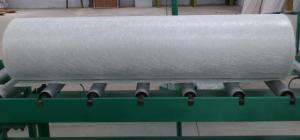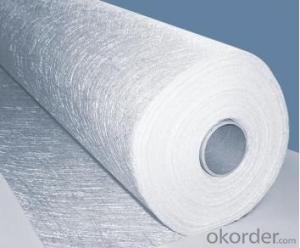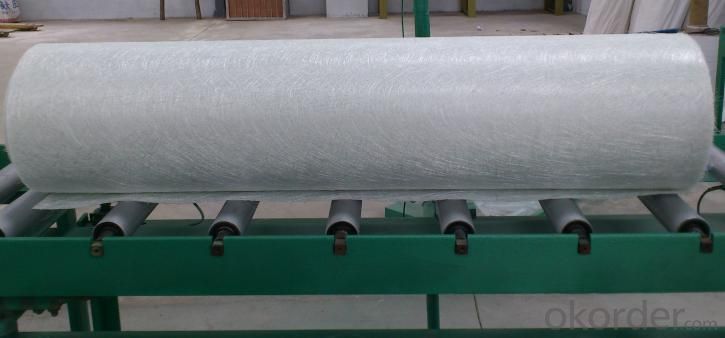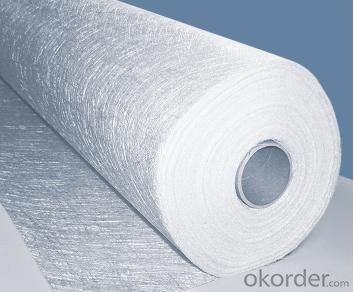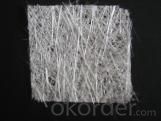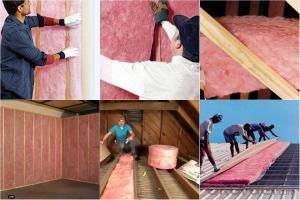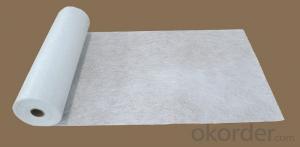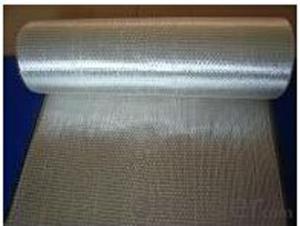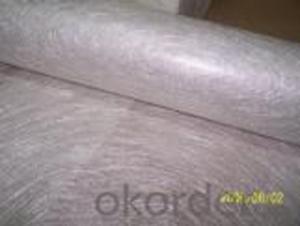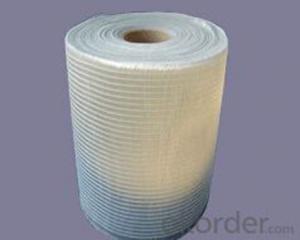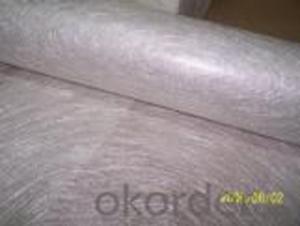Fiberglass Mat Tissue - C-Glass Stitch Chopped Strand Mat 450gsm, 50-2400mm
- Loading Port:
- Shanghai
- Payment Terms:
- TT or LC
- Min Order Qty:
- 2000 m²
- Supply Capability:
- 1000MT/Month m²/month
OKorder Service Pledge
OKorder Financial Service
You Might Also Like
Process
Fiberglass stitch chopped strand mat is the mat made of fiberglass roving which is at first be cut into certain length and evenly unfolded in all directions and then stitched with polyester yarn.
Properties
• Fiberglass no certain direction, good homogeneity.
• No powder or emulsion; sink quickly and easy to operate
• High tensile strength, easy to operate
• Good impact strength of finished products
Applications
Mainly be used as reinforced materials in the composite material industry.
• Matrix: unsaturated polyester resin, vinyl ester resin, epoxy resin and phenolic resin etc.
• Craft: winding, pultrusion, RTM, molded, hand lay up, etc.
• Ultimate products: Liner layer of tube, pultruded profiles, FRP body of boat, insulation board
IMAGES:
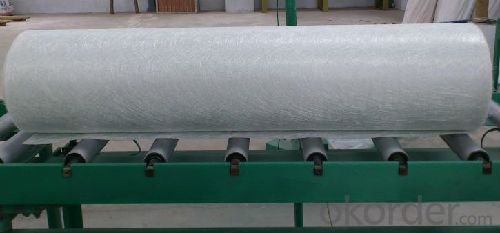
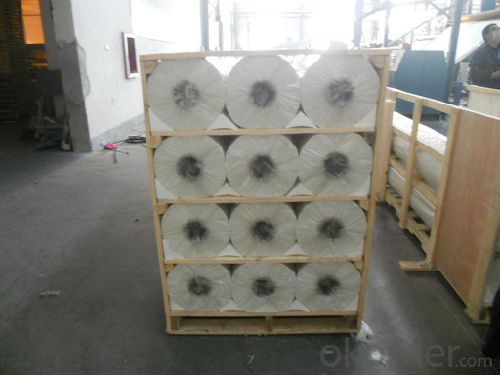
Specifications
Fibre type | Areal weight | Width | |
(g/㎡) | (mm) | ||
EMK 300 | E-Glass | 300 | 50-2400 |
EMK380 | E-Glass | 380 | 50-2400 |
EMK450 | E-Glass | 450 | 50-2400 |
CMK 300 | C-Glass | 300 | 50-2400 |
CMK380 | C-Glass | 380 | 50-2400 |
CMK450 | C-Glass | 450 | 50-2400 |
Packaging: Wrapped in PVC and placed within a cardboard carton. | |||
FAQ:
1. Why Choose us?
CNBM is a stated own company, provide the guarantee for the best quality, best service and safety business.
2. How will we guarantee the quality?
a, ISO 9001-2008 quality control system;
b, Strict and regular quality control in production;
c, Inspeciation when loading into container before shippment;
d, Sample stock for one year for quality tracing and record.
3. What is your MOQ?
Our MOQ is one pallet.
4. Can you provide sample?
Yes, samples are in stock. we can offer free sample for you.
5. Payment terms?
We can accept L/C, T/T etc.
6. Do you offer OEM service?
Yes, we can print customers’ logo on the packaging;
And the size and specification can be produced and design according to your demand.
7. What is the Production Lead Time?
1 *40HQ each day.
- Q: Can fiberglass mat tissue be used for making lightweight panels?
- Fiberglass mat tissue is capable of being utilized in the creation of lightweight panels. Comprised of delicate glass fibers that have been bound together with a resinous binder, this thin and lightweight material is commonly employed in the construction field to bolster surfaces and enhance the strength of diverse applications. When applied to panel manufacturing, fiberglass mat tissue proves to be an excellent selection for generating lightweight panels. The material's slim and pliable nature permits it to be seamlessly integrated into panels without imposing substantial weight. Furthermore, fiberglass mat tissue boasts exceptional strength properties, which contribute to the panels' overall structural integrity. Moreover, fiberglass mat tissue furnishes the panels with insulation and soundproofing capabilities, making them ideal for situations necessitating these attributes. Additionally, the material exhibits resistance towards corrosion and moisture, thereby augmenting the panels' durability and longevity. In summary, fiberglass mat tissue is a versatile and lightweight material that can be effectively employed in the production of lightweight panels. Its strength, flexibility, insulation properties, and resistance to corrosion and moisture render it a suitable choice for a range of applications in industries such as construction, automotive, aerospace, and marine.
- Q: What are the main applications of fiberglass mat tissue?
- Fiberglass mat tissue, an adaptable material, finds diverse applications in industries like construction, automotive, aerospace, and marine. Key uses of this material comprise: 1. Construction: Fiberglass mat tissue commonly reinforces and strengthens building materials in the construction industry, including roofing shingles, wallboards, and cementitious products. It enhances tensile strength and durability, rendering the structures more resistant to cracks, water damage, and weathering. 2. Automotive: The manufacturing of automotive parts, such as dashboards, door panels, and trunk liners, heavily relies on fiberglass mat tissue. It imparts structural integrity, sound insulation, and heat resistance, contributing to safer and more comfortable vehicles. 3. Aerospace: Lightweight composite materials used in aircraft structures benefit from the inclusion of fiberglass mat tissue. This material aids in reducing overall weight, improving fuel efficiency, and enhancing performance. 4. Marine: Fiberglass mat tissue plays a significant role in boat and shipbuilding. It provides strength, stiffness, and resistance to water and corrosion in the construction of hulls, decks, and other components. Its lightweight, durability, and low maintenance requirements make it preferable to traditional materials like wood. 5. Electrical and Electronics: Fiberglass mat tissue serves electrical insulation purposes, such as transformer boards, electrical cabinets, and switchgear. Its excellent dielectric properties, heat resistance, and mechanical strength ensure the safety and reliability of electrical equipment. 6. Filtration: Various filtration applications, such as air filters, water filters, and oil filters, employ fiberglass mat tissue. It acts as a filtration medium, capturing and eliminating impurities, dust, and particles from air, water, or oil, thereby enhancing the quality and purity of filtered substances. In summary, fiberglass mat tissue finds extensive use across industries due to its strength, durability, lightweight nature, and resistance to environmental factors. Its versatility enables it to be an indispensable component in diverse applications, contributing to the development of safer, sturdier, and more efficient products.
- Q: Is fiberglass mat tissue biodegradable?
- No, fiberglass mat tissue is not biodegradable.
- Q: Is fiberglass mat tissue suitable for insulation in chemical processing plants?
- Yes, fiberglass mat tissue is suitable for insulation in chemical processing plants. It is highly resistant to corrosion and chemicals, making it an ideal choice for such environments. Additionally, fiberglass mat tissue offers excellent thermal insulation properties, helping to maintain optimal temperature levels in the plant.
- Q: Can fiberglass mat tissue be used for bridge construction?
- Bridge construction can indeed utilize fiberglass mat tissue. This adaptable material provides numerous benefits. Its lightweight nature and impressive strength make it ideal for bridges, especially when weight is a key consideration. Moreover, fiberglass mat tissue boasts exceptional durability and corrosion resistance, essential for maintaining bridges' longevity. Its malleability allows for flexible bridge designs, as it can be easily molded into different shapes. In addition, fiberglass mat tissue possesses excellent impact resistance and fatigue performance, guaranteeing the bridge's ability to withstand heavy loads and constant traffic. All in all, fiberglass mat tissue represents a dependable and cost-effective option for bridge construction.
- Q: Can fiberglass mat tissue be used for flooring applications?
- No, fiberglass mat tissue is not typically used for flooring applications. It is commonly used in industries such as automotive, construction, and marine for insulation, reinforcement, and insulation purposes. Flooring applications usually require different materials such as tiles, hardwood, laminate, or vinyl.
- Q: Can fiberglass mat tissue be used for electrical enclosures?
- No, fiberglass mat tissue is not suitable for electrical enclosures as it does not provide sufficient insulation properties necessary for electrical safety.
- Q: Is the Teflon gasket filled with fiberglass or graphite?
- PTFE itself has the effect of self lubrication, you can ask the production of PTFE can add these, should not be able to! Vespel can add graphite to increase self lubrication
- Q: How does fiberglass mat tissue compare to spray foam insulation?
- Fiberglass mat tissue and spray foam insulation differ in terms of their insulation materials, characteristics, and benefits. Fiberglass mat tissue, a woven fiberglass insulation, is commonly used for thermal insulation in walls, roofs, and attics. It effectively resists heat transfer and provides an additional safety benefit with its fire-resistant properties. In contrast, spray foam insulation is a liquid that expands into a solid foam upon application. It fills in cracks and gaps, creating an airtight seal that prevents air leakage and reduces energy loss. It is also known for its soundproofing capabilities. Regarding installation, fiberglass mat tissue comes in large rolls or batts that require cutting and fitting. It must be carefully handled and may necessitate the use of protective equipment due to potential skin and respiratory irritation. On the other hand, spray foam insulation is applied using specialized equipment that sprays the liquid foam onto surfaces. It quickly expands, filling gaps and hardening within a short time. This makes it a convenient choice for insulating hard-to-reach areas or irregularly shaped spaces. In terms of cost, fiberglass mat tissue is generally more economical for purchase and installation compared to spray foam insulation. However, spray foam insulation provides superior air sealing and can result in higher long-term energy savings. In summary, each insulation type has its own advantages. Fiberglass mat tissue excels in thermal insulation, while spray foam insulation is ideal for air sealing and soundproofing. The choice between the two depends on factors such as budget, desired insulation performance, and project requirements.
- Q: Can fiberglass mat tissue be used for making decorative panels?
- Yes, fiberglass mat tissue can be used for making decorative panels.
Send your message to us
Fiberglass Mat Tissue - C-Glass Stitch Chopped Strand Mat 450gsm, 50-2400mm
- Loading Port:
- Shanghai
- Payment Terms:
- TT or LC
- Min Order Qty:
- 2000 m²
- Supply Capability:
- 1000MT/Month m²/month
OKorder Service Pledge
OKorder Financial Service
Similar products
Hot products
Hot Searches
Related keywords
